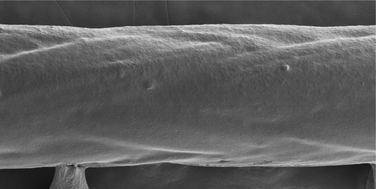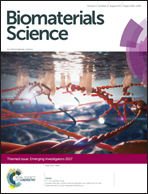Surgical suture releasing macrophage-targeted drug-loaded nanoparticles for an enhanced anti-inflammatory effect†
Abstract
A surgical suture is a medical device to close the wound site of skin and organs but excessive inflammation surrounding the suture can disrupt the wound healing process. Although post-operative prescription of anti-inflammatory drugs is used to manage the inflammation, the need for local drug delivery systems has been rising because of low bioavailability and fast clearance of drugs. In this work, we proposed a new strategy for a local anti-inflammatory device by incorporating macrophage-targeted anti-inflammatory nanoparticles into the suture. For macrophage-targeted anti-inflammatory nanoparticles, poly(lactic-co-glycolic) nanoparticles were loaded with anti-inflammatory drug diclofenac and decorated with polyethylene glycol and macrophage-targeting ligand mannose. These anti-inflammatory nanoparticles released diclofenac sustainably, and targeted activated macrophages efficiently. After nanoparticle optimization, a suture was coated with multiple layers of macrophage-targeted anti-inflammatory nanoparticles using a dip coating process. The suture releasing macrophage-targeted anti-inflammatory nanoparticles showed an enhanced anti-inflammatory effect in both macrophage culture and excisional wound healing animal models compared to a free drug molecule-coated suture. These results suggest that anti-inflammatory nanoparticle-coated sutures have great potential as an effective local delivery system to reduce inflammation and pain at the wound site.

- This article is part of the themed collection: Emerging Investigators 2017


 Please wait while we load your content...
Please wait while we load your content...